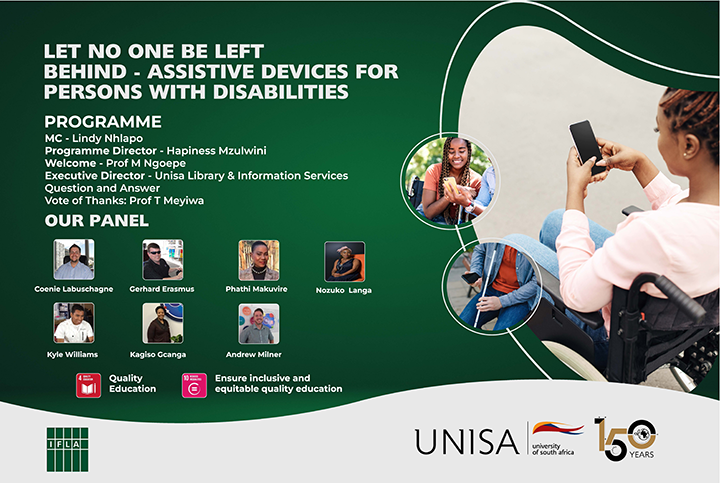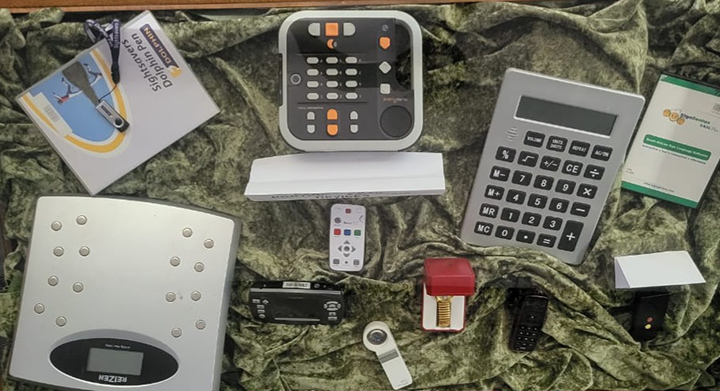News & Events
Boost for assistive device access at Unisa
Unisa Library and Information Services partnered with the International Federation of Library Associations and Institutions (IFLA) Regional Office for Africa to host a webinar on Assistive Devices for Individuals with Disabilities on 28 November 2023. The event, held in honour of National Disability Rights Awareness Month (observed from 3 November to 3 December to ensure inclusion for all, with the resonating theme of "Let no one be left behind”.

The Unisa Library and the IFLA recently formed a groundbreaking partnership, which was announced by Unisa on 23 August 2023, as indicated by Professor Mpho Ngoepe, the Executive Director of Unisa Library and Information Services. This strategic alliance will be in place from 2024 to 2026, and cater specifically for Sub-Saharan Africa. In his welcome address, Ngoepe emphasised the significance of an increasingly technologically driven world. He highlighted the pivotal role that technology plays in granting access to information in various formats, with an emphasis on its potential to promote social justice, equality, and overall freedom with the adoption of Agenda 2030 by the United Nations.
In relation to the United Nations Sustainable Development Goals (SDGs), the theme of the webinar encompassed the pursuit of both SDG 4, which focuses on quality education, and SDG 10, which seeks to reduce inequality and ensure that no individual is left behind. By being inclusive towards all its clients, Unisa aims to demonstrate that libraries can actively contribute to the achievement of the SDGs. The Unisa Library is committed to embracing disruptive technologies, without neglecting the essential inclusion of individuals who may rely on assistive devices. Its goal is to ensure inclusivity for all, so that no one is left behind in this ever-changing world.
In her speech, Nozuku Langa, a lecturer in the Department of Information Science and College of Human Sciences Disability Coordinator, highlighted the importance of understanding national and international laws that protect the rights of patrons with disabilities, as libraries have a responsibility to comply with these regulations. Non-compliance with these laws undermines the rights of individuals with disabilities, as defined by international agreements and the Constitution of South Africa. Libraries must guarantee accessibility by providing easy access to material, services, and programmes for their students and patrons. Librarians play a crucial role in supporting and empowering people with disabilities, by adhering to national and international regulations and advocating for inclusivity. Despite budget constraints, it is important to allocate resources to meet the needs of individuals with disabilities. Understanding these laws is imperative for effectively serving patrons with disabilities and prioritising their needs in project planning.

Assistive devices for persons with disabilities displayed at the Unisa Library
Langa emphasised the significant role of the Marrakesh Agreement in facilitating access to published works for those with print disabilities, particularly individuals who are blind or have other impairments. International laws provide guidelines for libraries, including the removal of barriers and provision of assistive technologies. Libraries should create dedicated spaces for patrons who need these technologies and raise disability awareness among staff. South Africa has specific laws for access to libraries by students with disabilities. Ensuring quality education for all means preventing discrimination and meeting individual needs. Users with disabilities should not disturb others while they are being provided with a comfortable environment. To promote inclusivity and equality, libraries should offer suitable spaces, consider the needs of visually impaired individuals using assistive technologies like Dragon software, and adhere to accessibility codes and guidelines. Evaluating the state of special needs education and collaborating with universities can enhance mobility and access for patrons with disabilities. Providing equal access to information and educational spaces can be achieved through the provision of assistive technologies and services.
Langa stressed the importance of collaboration between academics and libraries to ensure access to resources. When libraries face budget constraints, it is crucial for academic departments to intervene and assist where possible. The role of activists is to guarantee a well-educated society. This means providing access to software, hardware, and assistive technologies for individuals with disabilities. It is essential to develop inclusive programmes and activities, and physical meetings can be valuable in assessing the needs of disabled individuals.
While the acquisition of required resources can be challenging and costly, there are potential solutions, such as converting books to PDFs for easier access. Collaboration and financial support are key factors in making education accessible to all. Promoting accessibility to libraries entails the provision of physical assistance, technologies, and devices for various disabilities, as well as creating inclusive programmes and events.
Langa emphasised that it is essential for librarians to receive training and be knowledgeable about serving students with disabilities, in order to provide appropriate support. Recruiting students with a passion for library work and disability advocacy is also important. In South Africa. The challenges faced by people with disabilities can be overwhelming, but building relationships and implementing best practices can help to overcome such challenges. Universal design principles should be applied from the beginning to ensure equal access for all library patrons. In addition, inclusive programmes and events tailored to the needs of individuals with visual or hearing impairments should be implemented.
Lastly, she highlighted the importance of collaborating with disability advocacy organisations. When budget constraints arise, these organisations can assist by providing resources, sponsorships, or donations to support libraries. Therefore, it is essential to establish strong relationships with such organisations on both a national and international level. Moreover, it is important to align one’s library with international regulations, in order to enhance the well-being of all library patrons.
The presentations by panellists from Edit Microsystems, Gerhard Erasmus and Phathi Makuvire, showcased a range of assistive devices and technologies available from the company that cater for different educational needs, thereby helping students with various accessibility and motor impairments to participate more effectively in the educational process. The devices were classified as assistive devices for accessibility and motor impairments: These devices help students with physical disabilities or limitations in accessing educational materials and participating in academic activities. Examples of these devices include wheelchairs, walkers, or specialised seating arrangements.
For auditory and hearing impairments, there are devices and technologies that aid students with hearing loss or impairments, such as hearing aids, cochlear implants, or sign language interpreters.
For those who are blind or have visual impairments, there are assistive devices and technologies that support students with visual disabilities, such as screen readers, braille displays, or magnifiers.
In terms of communication, there are also devices and technologies that facilitate communication for students with speech, language, or social communication difficulties, such as speech therapy tools, language learning apps, or social skills training programmes.
AAAs (assistive adaptive aids) and innovative ICT (information and communication technology) are those devices and technologies that help students with various learning difficulties, such as attention deficit hyperactivity disorder (ADHD), autism spectrum disorder (ASD), or other learning disabilities. Examples of these devices include computer-based learning programs, mobile apps, or wearable devices that provide support for focus, organisation, or executive function skills.
The webinar was attended by a large international audience from countries such as Zimbabwe, Nigeria, Dubai, Uganda, Lesotho, Tunisia, Kenya, Senegal, and Botswana, among others. The event served as a benchmarking platform for librarians, knowledge specialists and managers, who shared comments on their countries and institutions’ practices and policies.
* By Itumeleng Mpete, Marketing Administrator, Unisa Library and Information Services
Publish date: 2023-12-19 00:00:00.0

